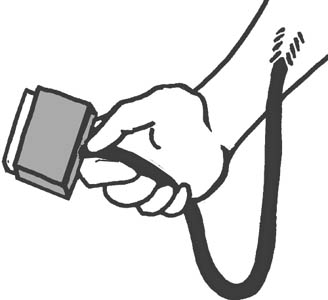![[Metroactive Features]](/features/gifs/feat468.gif)
[ Features Index | Silicon Valley | Metroactive Home | Archives ]

Techsploits Mother Cyborg By Annalee Newitz I HAVE ALWAYS been in favor of cyborgs, of human bodies threaded through with technology, but my faith was shaken when my mother was dying. I got the call last month, late at night: the operation had failed; her heart wouldn't beat. The doctors weren't sure she would last another few hours, but they had managed to get the local VA hospital to ship a high-tech heart pump to the intensive cardiac-care unit. They'd hooked her arteries up to its metal-reinforced plastic tubes and valves. The machine was beating for her instead of a heart. They were keeping her alive, hoping her organs would bounce back. I arrived in Cynthia's hospital room 12 hours later, after a series of sleep-deprived, hasty arrangements and what felt like the plane ride of doom. When I finally saw her, a tiny pale unconscious body at the center of a machine collage, I had already steeled myself for the worst. She's dying, I'd told myself over and over. I am here to deal with the death of my mother. But she was alive, and her internal organs were splattered all over the room: her body had been turned inside out, its functions rerouted to the computers that controlled her artificial heart, her digestive tract, her temperature, the levels of sodium and plasma in her blood. Her body--her real body, the one that gave hugs and head pats--was hidden in layers of blankets and obscured by tubes. But I saw gore and viscera in the wires, boxes and lights that made up her surrogate life system. And I choked. I who have spent the last several years among machines, developing relationships with networks and peripherals and devices that alter my body and my perceptions--I who have lived among people whose bodies are physically wired up to computers all the time, or whose mobility depends upon machines--I choked. I saw my mother, the cyborg, and I couldn't stay in the room. Biting my lip, digging my nails into my arms, I stood outside her door and stared at my mother's feet, sticking out of the covers at the end of her bed. They were her natural-born feet, no technological intervention necessary for their welfare. I knew the machines were helping her, that the long, fat tubes full of dark red snaking out from under her covers into a pump were possibly saving her life. I knew she needed the feeding tube up her nose, the breathing tube down her throat, the half-dozen IV drips and drainage tubes. I knew the drill--hell, I'd written the damn drill dozens of times--about how our bodies are just machines, and when they break down or need enhancement we should use our own admittedly crude machines to help them along. But upon seeing a true cyborg, her survival dependent on a hybrid of biology and medical technology, my first reaction was utter horror. Those machines were violating her body. They were unnatural. But I overcame my initial response. For a whole week, I visited my mother several times a day and held her hand, learned about the strengths of the technology aiding her and the weaknesses of the physiology failing her. If she could survive, it didn't fucking matter to me whether she was a machine or not. The tools keeping her alive had become part of her body, and in the end that's all that mattered. This story does not have a happy ending. My mother died in the process of becoming a cyborg. During another surgery to put her on a semipermanent heart pump, one small enough for her to carry in an over-the-shoulder bag, her lungs simply failed. Despite the considerable talents of Cynthia's surgeons, hers was not one of those bodies that could survive being ported to a ventricular assist device. I was reminded of the time when I installed the Linux operating system on my laptop, which had up until that time run only Windows. "It may not work," Jesse warned me. "You just never know what will happen when you reformat a hard drive like this." I held my breath as the drive spun. And so my laptop lived, but my mother died. Perhaps it was some accident in hardware design. The surgeons said that her heart may have been diseased for years. If she hadn't gotten this bacterial infection, she might have failed in some other way--a heart attack, a processor burnout. Have you ever seen a processor burn? Happens sometimes when it your fan breaks and doesn't cool the thing down. You'll hear a faint, high-pitched whining noise, then the chip will emit a barely perceptible puff of smoke. Sometimes it smells like burning plastic. Nothing changes on the outside of the chip; its body remains intact to the naked eye. But it will never run again. It will never push or pop or throb with electrons, or process impossibly huge floating-point numbers, or make the graphics on your screen render at top speed. It's just dead.
Annalee Newitz (inmemoriam@techsploitation.com) is a surly media nerd who still loves cyborgs.
Send a letter to the editor about this story to letters@metronews.com. [ Silicon Valley | Metroactive Home | Archives ]
|
From the November 21-27, 2002 issue of Metro, Silicon Valley's Weekly Newspaper.
Copyright © Metro Publishing Inc. Metroactive is affiliated with the Boulevards Network.
For more information about the San Jose/Silicon Valley area, visit sanjose.com.